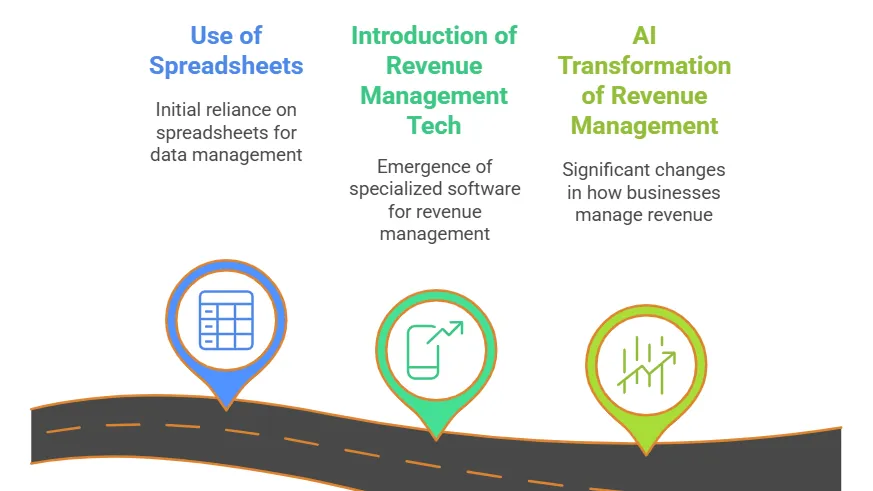9th February, 2025
From Spreadsheets to AI: How Revenue Management Tech Has Transformed

I wonder if the skills that made me successful in revenue management years ago would still hold up in today's AI-driven world?
I remember, when I first started in revenue management at The Oberoi Group, things looked a lot different than they do today. Back then, Excel was king and if you were one of the few who could navigate advanced formulas, pivot tables, and macros, you were already ahead of the game. Revenue decisions relied on spreadsheets, and every update required meticulous manual effort. It wasn't just about setting rates; it was about spotting patterns, forecasting demand, and making strategic decisions with limited tools. The ability to think analytically made all the difference.
Then came the first wave of technology—channel managers and rate shoppers. Suddenly, we could track competitor pricing in real time and manage distribution more efficiently. It felt like a revolution. Then integration-enabled revenue management systems took it even further, allowing pricing, forecasting, and distribution to sync in a way that was once unimaginable. For the first time, we weren't just reacting to demand; we were predicting and shaping it.
Now, we're in the era of AI-driven revenue management, and my latest research for a presentation on digital tools revenue directors will rely on in 2025 made one thing clear—this is just the beginning.
AI is no longer just a tool for automation; it's an intelligence amplifier. Instead of sifting through endless reports, revenue leaders can ask AI-driven platforms specific questions and get strategic insights instantly. During my research, I expected to find that predictive analytics and automation would dominate the future, but AI challenged my thinking. The biggest trends shaping revenue management are hyper-personalization, dynamic pricing intelligence, and real-time revenue orchestration.
In 2025, revenue management won't be about analyzing past trends—it will be about adapting to real-time changes instantly. AI will adjust pricing dynamically based on demand fluctuations, customer behavior, and external market conditions. Personalization will be the norm, with AI-driven tools tailoring rates and offers to individual guests, not just broad customer segments. AI will predict churn, optimize sales strategies, and proactively manage demand before revenue leaks happen.
Key takeaways from my research:
- AI is not replacing revenue managers—it's making them more strategic. AI automates data analysis, but the best revenue leaders will know how to ask the right questions, interpret insights, and make high-level strategic decisions.
- Dynamic pricing is evolving beyond supply and demand. AI will set rates in real time based on customer intent, competitor behavior, economic trends, and even weather patterns. Pricing will become fluid, adapting instantly to maximize revenue.
- Personalization will be the biggest revenue driver. Instead of blanket promotions, AI will customize rates and offers for each guest, increasing conversions and driving loyalty.
- Revenue management will move from forecasting to proactive decision-making. AI will help revenue leaders anticipate demand shifts, flag potential churn, and even adjust marketing efforts dynamically to drive bookings.
- Seamless integrations will be a must, not a luxury. Standalone systems will be obsolete. Revenue management, CRM, sales, and marketing tools will work as one, ensuring data flows across departments for a unified strategy.
- The role of the revenue leader is shifting. Instead of just pricing rooms, revenue directors will become business strategists, leveraging AI-driven insights to optimize profitability across all revenue streams.
The Future is Here—Are You Ready?
This isn't just about new tools; it's about how we work, strategize, and lead in an AI-first world. My research with ChatGPT didn't just save me time—it pushed my thinking and challenged my assumptions in ways traditional research never could. If you're not already integrating AI into your workflow, now is the time—because in 2025, revenue directors won't just be using AI tools; they'll be driving strategy with them.
What's your take? How do you see AI reshaping revenue leadership? Let's discuss.
Until next time,
Geetika Bahri J.
